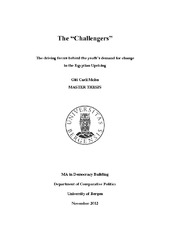The "Challengers": The driving forces behind the youth's demand for change in the Egyptian Uprising
Master thesis
Permanent lenke
https://hdl.handle.net/1956/7340Utgivelsesdato
2012-11-20Metadata
Vis full innførselSamlinger
Sammendrag
This study reflects on what were the most important motivational factors for the Egyptian youth to participate in the 25th of January 2011 revolution. By applying a conceptual framework from social movement theory, it attempts to explain what paved the way for the Egyptian youth's participation in the 18 days of protest in Tahrir Square. The analysis is based on qualitative interviews conducted with Egyptian youth who participated in the revolution, as well as on interviews with area specialists. The analysis shows that the youth's motivation to participate in the upheavals was capitalized on a combination of domestic and regional events. While the political, economic, and social order described the underlying factors simmering in the country, the death of Khaled Said awakened the Egyptian youth and framed their grievances. This incident served both as a turning point and a symbol that unified them. These factors came to the surface, and the youth dared to take to the streets as soon as they saw that the Tunisian people had succeeded in overthrowing their own authoritarian regime. The Tunisian revolution served as a model, both by demanding the downfall of the autocratic regime the Egyptian people identified with, and by demonstrating the possible effects of collective action. For the future of Egypt, it seems crucial that not only the government, but also families, learning institutions, political parties and religious institutions give young people increasing attention and influence.
